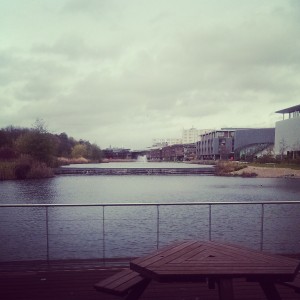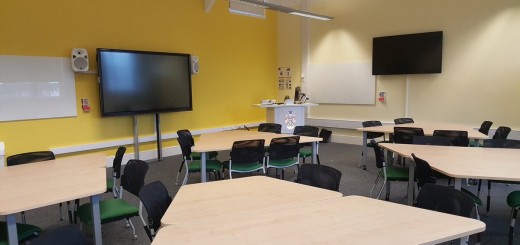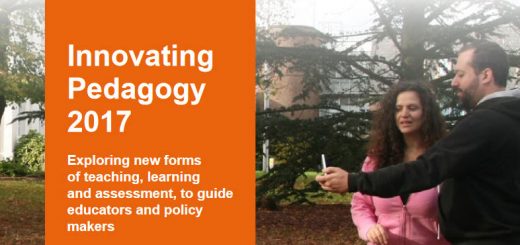Reflections on 19th Annual SEDA Conference
The 19th Annual SEDA Conference, entitled ‘Opportunities and challenges for academic development in a post-digital age’ took place on 13 – 14 November 2014 at the National College Learning and Conference Centre, Nottingham.
As well as attending the conference, Daniel & I were successful in our workshop proposal, entitled “Badges? We don’t need no stinkin’ badges!”, something which we will blog about later this week.
The opening keynote address, ‘The design and accreditation principles of adopting open practices‘, was delivered by Grainne Conole, Director, Institute of Learning Innovation, University of Leicester. During her keynote, Grainne pointed to the NMC Horizon Report & OU Innovating Pedagogy Report as key guides to future developments with technology, always interesting reads for anyone interested in TEL. She also mentioned the ‘7Cs of Learning Design Toolkit‘, an integrated set of resources for technology-enhanced learning design across disciplines., and a model we’re currently looking to adapt for workshops at YSJ.
Visual notes from @gconole keynote #sedaconf – will tidy up and scan and share again pic.twitter.com/mTKN71GdAm
— Sheila MacNeill (@sheilmcn) November 13, 2014
For the first parallel session of the conference I attended a presentation by Kathryn James on ‘Rhetoric and reality: The drive of learning technology and its implications for academic development‘. Kathryn discussed the drive of technological determinism in higher education, and highlighted some of the motivations and drivers related to learning technology, and how these might impact on academic identity. She also asked us to consider the role of academic development in relation enhancement of learning, teaching and assessment, and how the role impacts on academic confidence and empowerment for utilising learning technology.
‘Does technology drive higher education?’ asks Kathryn James #sedaconf – discussing technological determinism and identity of academics. — David Walker (@drdjwalker) November 13, 2014
During parallel session two I went to a presentation by Rebecca Dearden on ‘Working in a “third space” to create an institutional framework to underpin use of audio and video‘. Rebecca identified how partnership working between academic and professional colleagues, using the concept of the “third space”, has enabled development of institutional policy to support embedded use of technology at the University of Leeds. A website ‘Changing Landscapes‘ is available to accompany their Digital Learning Programme, with information about new technologies and approaches, and ideas and case studies to enable their staff to make the best use of the technologies for teaching and research.
Rebecca Dearden on shifting academic identities, ed tech, and the emergence of ‘third space’ practice #sedaconf pic.twitter.com/XxNjCQtuVR
— Keith Smyth (@smythkrs) November 13, 2014
After lunch I headed to parallel session three and ‘Visioning the Digital University – from institutional strategy to academic practice‘ with Sheila MacNeill, Bill Johnston & Keith Smyth. We were asked to identify a number of factors, dimensions and implications that relate to the emerging concept of the ‘digital university’, and consider a strategic framework for conceptualising the construct of a digital university, under the key themes of curriculum design, digital participation, information literacy & learning environments. We also heard from Keith about the Digital Futures consultation at Edinburgh Napier, a strategic consultation focussing on key themes and the recommendations for learning, teaching, staff development, and educational scholarship.
@sheilmcn and Bill Johnston’s matrix model for the digital university #sedaconf pic.twitter.com/9KgKF1JHao — Keith Smyth (@smythkrs) November 13, 2014
During the networking session I went to a talk on the SEDA Professional Development Framework (PDF). Aimed at SEDA programme leaders and potential programme leaders, this was an opportunity to learn more about the SEDA award recognition and programme review processes. Our current SEDA awards – Supporting Learning with Technology (SLT) and Embedding Learning Technology (ELT) – are due for re-accreditation next year, and there might also be an opportunity to provide some new research development courses, so I wanted to make sure we were up to speed with the process.
The final parallel session of the day was ‘Extending educational development through accredited open online courses – ‘non-traditional participants’ perspectives on a UK PSF Descripter 1 (M)OOC‘ with Neil Currant, Elizabeth Lovegrove, Cat Taylor & Chijioke Nwalozie. The team from Oxford Brookes, along with 2 of their students, explained how accredited open online courses were being used to extend the provision of educational development. The Oxford Centre for Staff and Learning Development (OCSLD) deliver a range of online courses, designed to model best practices and many of which can lead to accreditation, such as academic credits and/or FHEA for example.
Day 2 started with a keynote address by Helen Beetham, Consultant in Higher Education, on ‘Being post-digital: in the wake, in response, in recovery?‘.
I think the presentation is best summed up by the range of responses, thoughts, questions & comments on the #SEDAPostDigital hashtag:
Parallel session five was Daniel & I talking about Open Badges – blog post to follow later this week!
Making badges with the YSJU TEL team at the #sedaconf with @PhilVincent. Art & design was never my strong point 🙂 pic.twitter.com/oBbO4caBxO — Sally Chappell (@Sal_Chappell) November 14, 2014
For the sixth & final parallel session I attended ‘How to share good practice with busy academics in a large University‘ with Kieran Kelly from UWE. During the session we identified some of the drivers for the use of on-line resources to support learning and teaching and considered the use of technology to support the spread of good practice. UWE have developed an intranet (SharePoint) to bring together good practice in learning and teaching. A variety of techniques have been adopted to complement the sharing of teaching knowledge that has traditionally occurred in staffrooms, refectories, offices and corridors. It takes advantage of speed of search, multimedia distribution, social media, memory and network to provide examples of practice to colleagues across the University.
Interesting session on sharing good practice – pros and cons – by Kieran Kelly at UWE #sedaconf pic.twitter.com/m2REyHEvt6 — Chris Rowell (@Chri5rowell) November 14, 2014
The closing keynote: ‘How do we go from here? Meeting the challenges through partnership‘ was delivered by Mark Kerrigan of the Change Agent Network, and Director of Teaching, Learning and Assessment, Anglia Ruskin University. Mark talked about the increasing drive to engage students and staff in partnership, how many universities have developed approaches to involve students to inform governance, policy, and address change leading to improvement, and how the role of students and staff engaged as change agents is now attracting increasing attention. Mark pointed to a range of useful resources including the Change Agent Network, NUS Student Engagement Toolkit, The Journal of Educational Innovation, Partnership and Change, and Transforming the Experience of Students through Assessment (TESTA).
Just before we left there was a prize draw and Daniel’s day was made…
Woohoo! I won a book #sedaconf 🙂 pic.twitter.com/ObOPv3C949 — Daniel Mackley (@danielmackley) November 14, 2014
You can capture a flavour of the entire conference from the #SEDAconf hashtag: #sedaconf Tweets
Or from this curated Storify from Sue Beckingham:
This was my first experience of the SEDA conference, and it was refreshing to attend an event focussed on educational development, rather than technology. The entire conference was excellent, there was a great range of presentations & workshops, and the standard was extremely high. There were a few familiar faces in the audience, which is perhaps a reflection of the blurring lines between TEL & educational development, a topic which is generating a lot of discussion recently, and I was also able to meet new people and make a lot of new connections. I’m already looking forward to the 20th Annual SEDA conference in 2015…



